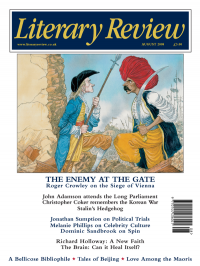Donald Rayfield
The Monster Hedgehog
Yezhov: The Rise of Stalin’s ‘Iron Fist’
By J Arch Getty & Oleg V Naumov
Yale University Press 283pp £25
Yezhov means ‘Hedgehog’, although Stalin called him affectionately Yezhevichka, ‘little bramble’. Despite the implicit prickliness, there was momentary relief in the USSR when, in autumn 1936, Stalin appointed N I Yezhov head of the NKVD, as the secret police was then called. It seemed that at last a series of Polish gentry (Dzierżyński and Menzhinsky) and a Russian Jew of Polish origin (Yagoda) had given way to a diminutive working-class Russian lad, a friendly, sociable troubleshooter.
Within weeks this illusion was shattered: in the next two years Nikolai Yezhov despatched more people to torture and execution than possibly anyone in human history, and created an atmosphere of all-pervading terror that crippled the nation’s psyche for generations. Not until autumn 1938, when Stalin brought Lavrenti Beria to

Sign Up to our newsletter
Receive free articles, highlights from the archive, news, details of prizes, and much more.@Lit_Review
Follow Literary Review on Twitter
Twitter Feed
Under its longest-serving editor, Graydon Carter, Vanity Fair was that rare thing – a New York society magazine that published serious journalism.
@PeterPeteryork looks at what Carter got right.
Peter York - Deluxe Editions
Peter York: Deluxe Editions - When the Going Was Good: An Editor’s Adventures During the Last Golden Age of Magazines by Graydon Carter
literaryreview.co.uk
Henry James returned to America in 1904 with three objectives: to see his brother William, to deliver a series of lectures on Balzac, and to gather material for a pair of books about modern America.
Peter Rose follows James out west.
Peter Rose - The Restless Analyst
Peter Rose: The Restless Analyst - Henry James Comes Home: Rediscovering America in the Gilded Age by Peter Brooks...
literaryreview.co.uk
Vladimir Putin served his apprenticeship in the KGB toward the end of the Cold War, a period during which Western societies were infiltrated by so-called 'illegals'.
Piers Brendon examines how the culture of Soviet spycraft shaped his thinking.
Piers Brendon - Tinker, Tailor, Sleeper, Troll
Piers Brendon: Tinker, Tailor, Sleeper, Troll - The Illegals: Russia’s Most Audacious Spies and the Plot to Infiltrate the West by Shaun Walker
literaryreview.co.uk